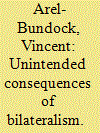| Srl | Item |
| 1 |
ID:
088739


|
|
|
| 2 |
ID:
141852


|
|
|
|
|
| Summary/Abstract |
How does the institutional design of a state's bureaucracy affect foreign policy? We argue that institutions can moderate bureaucrats’ incentives to act in accordance with an Executive's diplomatic preferences. Where the Executive can influence budgets or career paths, bureaucrats face incentives to adopt her diplomatic goals as their own. Where agencies are shielded from Executive influence, bureaucrats are free to act independently in a bid to enhance their autonomy and their reputation for competence. To test these expectations, we develop a new measure of bureaucratic independence for the 15 aid-giving agencies in the US government. We analyze how independence affects foreign aid allocation patterns over the 1999–2010 period. We find that in “dependent” agencies, foreign aid flows track the diplomatic objectives of the president. In “independent” agencies, aid flows appear less responsive to presidential priorities and more responsive to indicators of need in the recipient country. Our results highlight limits on the diplomatic use of foreign aid and emphasize the importance of domestic institutional design. Our findings yield insight into a broad range of policy domains—including international finance, immigration, and the application of economic sanctions—where multiple government agencies are in charge of implementing foreign policy.
|
|
|
|
|
|
|
|
|
|
|
|
|
|
|
|
| 3 |
ID:
172333


|
|
|
|
|
| Summary/Abstract |
When do governments impose costs on foreign firms? Many studies of foreign direct investment focus on incentives for government expropriation, but scholars are often forced to rely on indirect measures of expropriation to conduct empirical analyses. This article introduces a data set which includes information on over 5,000 political risk insurance contracts issued by the US Overseas Private Investment Corporation since 1961, and on all the claims filed by investors under these contracts. These detailed insurance data allow us to study the determinants of foreign investors’ losses from a variety of sources, including expropriation, inconvertibility, and violent conflict. To illustrate the benefits of these data for hypothesis testing, we adopt a comprehensive empirical approach and explore both shared and distinct causes across risk categories.
|
|
|
|
|
|
|
|
|
|
|
|
|
|
|
|
| 4 |
ID:
153606


|
|
|
|
|
| Summary/Abstract |
The international tax system is a complex regime composed of thousands of bilateral tax treaties. These agreements coordinate policies between countries to avoid double taxation and encourage international investment. I argue that by solving this coordination problem on a bilateral basis, states have inadvertently created opportunities for treaty shopping by multinationals. These opportunities, in turn, reduce the potency of fiscal policy, put pressure on governments to change their domestic tax laws, and ultimately constrain state autonomy. This constraint is theoretically distinct from the usual race-to-the-bottom story and it generates different testable implications. I use a motivating case study to show how multinationals leverage the structure of the treaty network to reduce their tax burden. Then, I develop a new measure of treaty-shopping opportunities for firms in 164 countries. Where the proliferation of tax treaties allows multinationals to engage in treaty shopping, states’ fiscal autonomy is limited, and governments tend to maintain lower tax rates.
|
|
|
|
|
|
|
|
|
|
|
|
|
|
|
|